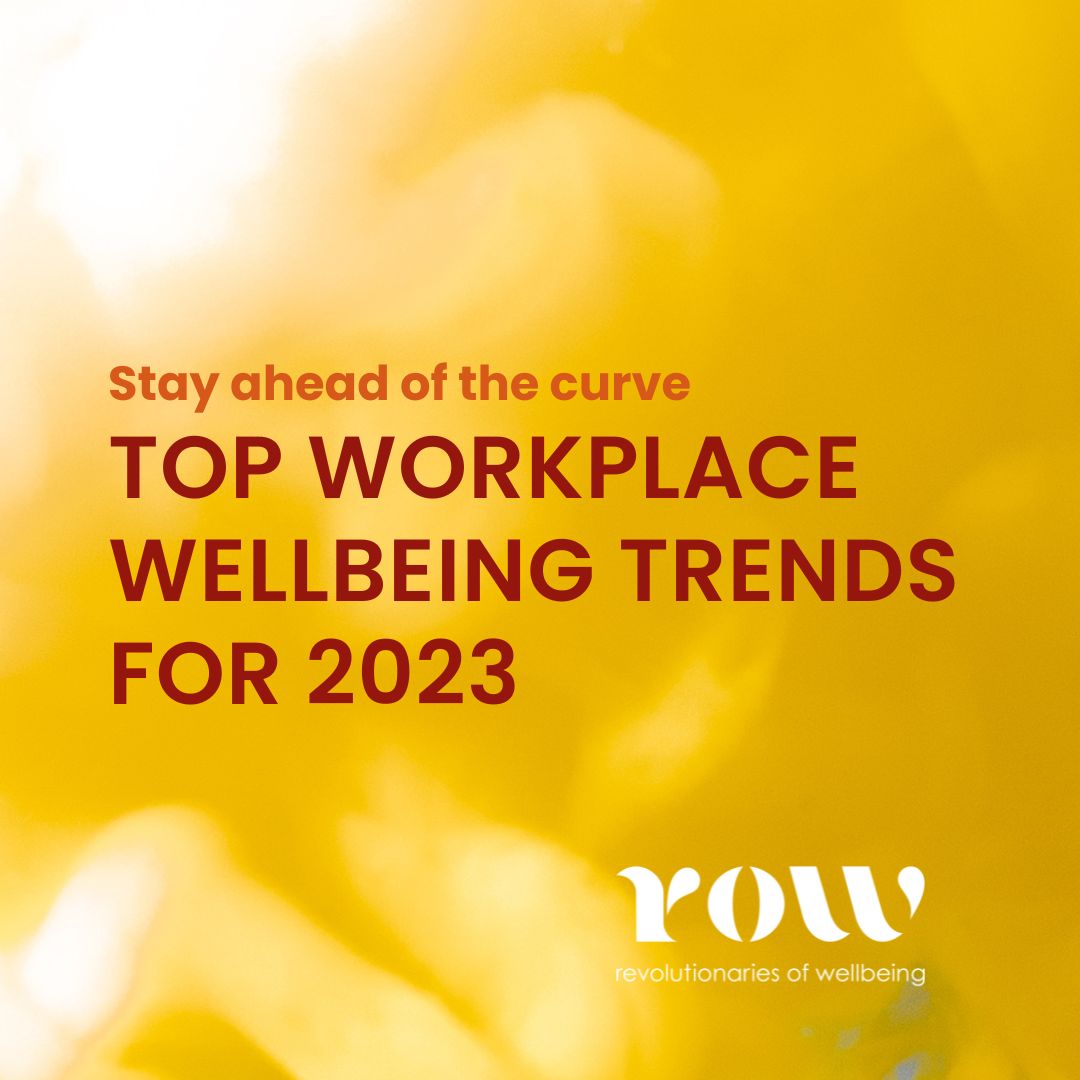While workplace wellbeing was on the radar for many businesses pre-COVID, the demands and unpredictable nature of the pandemic fast-tracked wellbeing strategies, programs and initiatives in order to provide people with much-needed support.
For some businesses, it meant building workplace wellbeing support from scratch. For others, it was strengthening what they already had in place.
Looking ahead, adaptive businesses will look to build on the momentum of what they have built through previous years into 2023, addressing the big issues that will make a sustainable difference.
So, with that in mind, here is Revolutionaries of Wellbeing’s top 5 predictions for 2023:
1. Employee expectations will increase – and employers will need to move quickly to respond
One of the few silver linings from the pandemic was an increasing acceptance of the importance of workplace wellbeing. People are generally more aware of their own mental state and the impact of work on health. Gen-Z are also entering the workforce with a higher level of mental health awareness. As a result of this, employees will have increasing expectations on their workplace to proactively manage wellbeing, and they won’t stick around if businesses take a haphazard approach.
A 2022 Deloitte Survey found that 62% of employees and 82% of C’Level executives would be more likely to stay with their company if it better supported their wellbeing.
The job market is still as hot as ever, so organisations looking to retain top talent will need to look closely at the work environment, culture and retention strategies. More organisations will also employ someone dedicated to managing wellbeing to ensure the business remains focused on delivering on its promises.
2. Hybrid working will continue to be refined, and will BRING NEW wellbeing challenges and opportunities
For organisations with large numbers of office-based employees, 2021 and 2022 were all about being nimble and agile to respond to the demand for hybrid working arrangements in the face of the pandemic. As these processes have largely been bedded in, 2023 will see continued adjustment and refinement.
Wellbeing managers and people leaders will need to be alert to the emerging risks caused by prolonged isolation of 100% remote employees. Organisations will continue to experiment to find the right balance between face-to-face connectivity and the flexibility provided by working-from-home arrangements.
Social wellbeing will be an increasingly important focus to give people a sense of belonging, no matter how they work.
One note of caution here: while it’s easier to provide flexibility to office-based workers whose work allows them to effectively work from home, appropriate care and attention needs to be given to the wellbeing needs of those who can’t work from home as easily. We can’t allow wellbeing to be the privilege of the corporate few, just because it’s easiest.
3. With the increased cost of living continuing to bite, financial wellbeing will grow in importance
The current economic headwinds and rising cost of living is having a broad impact across society. Lowering property prices and rising interest rates are placing a strain on home-owners who may find themselves struggling to make mortgage payments. This means that financial stress is going to be a heightened risk to a growing group through 2023.
Wellbeing professionals should consider what further initiatives, coaching or support they can put in place to assist employees who may be feeling increased financial pressure. Careful messaging around building financial capability will also be key when employees feel their pay is not reflective of their efforts.
4. Workplace wellbeing programmes will become more individualised
As organisations grow in their wellbeing maturity, there will be an increased understanding that wellbeing is a highly individualised quality that means different things to different people, and it is critical to meet people where they are. More organisations will recognise that customisable approach, based on an individual’s wellbeing needs, is the most effective method of engagement.
Wellbeing professionals who can work in tandem with their organisation’s DE&I function will be able to quickly deliver meaningful programs with impact to a greater range of people.
Multinational organisations must be careful not to adopt a one-size-fits-all approach to wellbeing across the countries in which they operate and will need to consider the different demographics, psychographics and cultural norms on mental health and wellbeing in their strategy. Assume nothing and ask lots of questions.
5. Wellbeing literacy and leadership will be an in-demand skill
With the war on talent raging, leaders will need to urgently upskill in wellbeing literacy to meet business demands and employee expectations in 2023. Increasingly, wellbeing literacy will become a key criterion for a leadership job and it will be included more often in workplace leadership frameworks.
While leaders are not expected to be therapists, they should understand how wellbeing is defined in their organisation, the drivers of wellbeing, and the impact of their own behaviour, values and actions. They should also understand how to have a wellbeing/mental health conversation and be across the features of psychological safety.
There will also be pressure on senior leaders to better support the wellbeing of middle managers, ensuring they can effectively deliver on work without comprising wellbeing.















